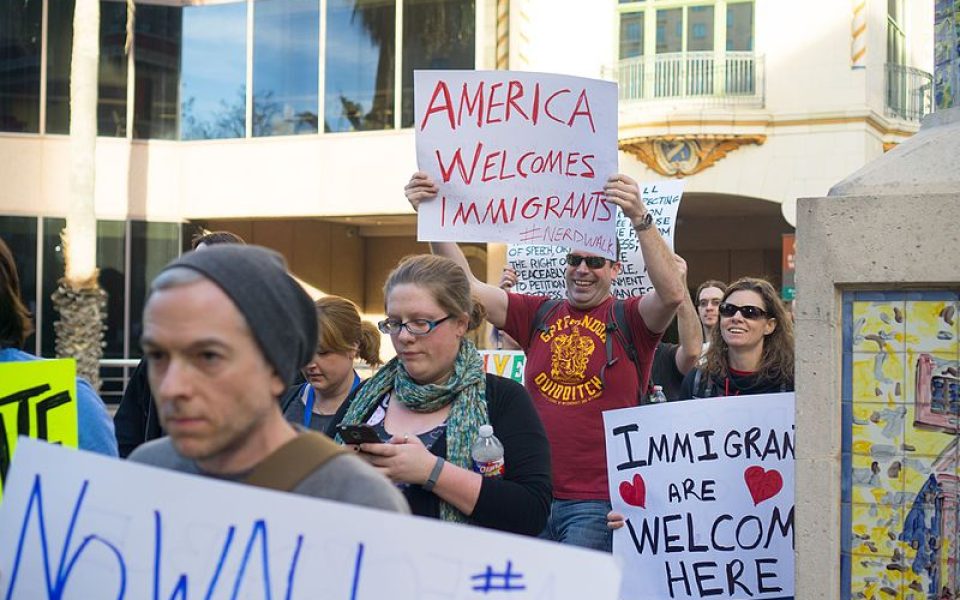The Supreme Court’s ruling in Trump v. Hawaii on Tuesday rightfully joins Dred Scott and Korematsu in infamy as a shameful abrogation of the Constitutional principle of equal rights under the law.
Regretfully, the travel-ban ruling places the imprimatur of legal legitimacy on Trump’s aggressive project to elevate a vision of nationalism based primarily on membership in the white race and Christian faith. Muslims — like Mexican “drug dealers,” MS-13 “animals” and black “crime” — are being vilified by the president to reinforce a sense of siege against demographically dwindling white Christian America.
Trump has effectively portrayed himself to his base as the strongman protector.
“The Democrats want open borders; they want anybody they want, including MS-13, pouring into the country,” he said, campaigning for Henry McMaster in South Carolina on Monday. “The Democrats want to protect illegals coming into the country, some of whom are not good, some of whom cause lots of problems in the worst possible way. They want to protect illegals coming into the country much more than they want to protect you, and that’s not where we’re coming from.”
Curiously, the conservative majority opinion in Trump v. Hawaii sidestepped the question of intent. Typically, discrimination claims fail because claimants are unable to prove intent thanks to the fact that few judges possess the omniscient ability to look into the hearts of men and women, and measure their malice. On the question of whether the travel ban violates the Establishment Clause of the Constitution, which forbids government action that favors one religion over another, then-candidate Trump made his intent abundantly clear in December 2015, when he said, “Donald J. Trump is calling for a total and complete shutdown of Muslims entering the United States until our country’s representatives can figure out what the hell is going on.”
The Supreme Court opinion, written by Chief Justice John Roberts, elliptically refers to Trump’s declared intent as “a series of statements by the president and his advisers both during the campaign and since the president assumed office,” and simply finds: “For today’s purposes, the court assumes that it may look behind the face of the proclamation to the extent of applying rational basis review, i.e. whether the entry policy is plausibly related to the government’s stated objective to protect the country and improve vetting processes.”
As the order acknowledges, officials in the Department of Homeland Security, along with colleagues in the State Department and intelligence agencies, devised a policy to improve vetting processes and meet the government’s stated objective of protecting the country long after Trump broadcast his hostility towards Muslims. The task before Trump’s DHS underlings was pretty obvious: Come up with a policy that will translate the boss’s bigotry into action while clearing judicial scrutiny. The multiple iterations of the policy, which have been bandied between lower courts for the past 18 months, tell the story. The first ban, issued in January 2017, applied to seven overwhelmingly Muslim countries — Iran, Iraq, Libya, Syria, Somalia, Sudan and Yemen — while containing an exemption for refugees who were religious minorities in their own countries (read: Christians). After the original ban was challenged in the courts, Trump replaced it with a second that removed Iraq from the list while eliminating the exemption for Christians. The final iteration, which is the subject of the Supreme Court’s ruling on Tuesday, included Iran, Iraq, Libya, Syria, Somalia and Yemen, while substituting Chad for Sudan. Two other non-Muslim countries added to the list — North Korea and Venezuela — look like a fig leaf. (Chad was later dropped from the list after administration officials determined it had sufficiently improved its vetting protocols.)
The United States’ history is rife with examples of exclusion akin to the travel ban, and this country has deep-seated legacies of genocide, slavery and conquest that need to be addressed before it can fully realize its potential as a multi-racial, multi-faith democratic polity. The Civil War partially resolved the United States’ foundational contradiction, although White House Chief of Staff John Kelly’s statement in late 2017 that the war could have been avoided through compromise presents a symbolic unraveling of the national consensus on racial equality before the law. The slavery question was supposed to have been settled in 1865.
Justice Sonia Sotomayor’s dissent stands as a tragic signpost for the road not taken.
Commenting on Korematsu, the 1944 ruling by the Supreme Court that found that President Franklin Roosevelt’s order to hold Japanese Americans in internment camps during World War II, Sotomayor writes, “The formal repudiation of a shameful precedent is laudable and long overdue. But it does not make the majority’s decision here acceptable or right. By blindly accepting the government’s misguided invitation to sanction a discriminatory policy motivated by animosity towards a disfavored group, all in the name of the superficial claim of national security, the court redeploys the same dangerous logic underlying Korematsu and merely replaces one ‘gravely wrong’ decision with another.”
Join the First Amendment Society, a membership that goes directly to funding TCB‘s newsroom.
We believe that reporting can save the world.
The TCB First Amendment Society recognizes the vital role of a free, unfettered press with a bundling of local experiences designed to build community, and unique engagements with our newsroom that will help you understand, and shape, local journalism’s critical role in uplifting the people in our cities.
All revenue goes directly into the newsroom as reporters’ salaries and freelance commissions.


Leave a Reply